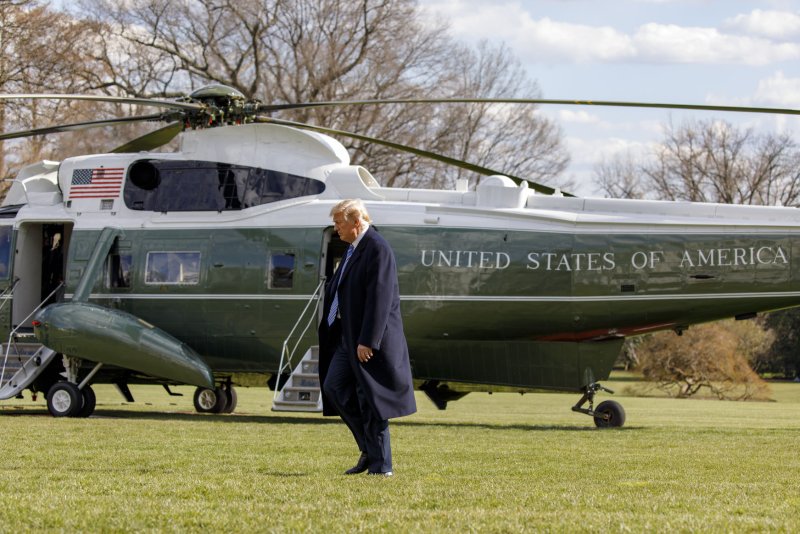President Donald Trump walks across the South Lawn of the White House toward Marine One as he departs the White House for a weekend trip to Mar-a-Lago, Fla., on Friday. Photo by Alex Edelman/UPI |
License Photo
March 26 (UPI) -- Every day at the White House turns astonishment into understatement. And the next move by President Donald Trump often defies rational explanation.
Last week proved the point, although no one should be surprised by what next week may bring.
Trump declared economic war on America's trading partners; bureaucratic war on his most senior aides; political war on Special Counsel Robert Mueller; a phony war against his predecessors for not having the "smarts" or "chemistry" to deal with North Korea; and a war of words and legal threats against a porn actress, former Playboy Bunny and a fired Celebrity Apprentice.
Perhaps the president would have been better off if he had read a little history about how two-front wars usually spelled disaster. And now he is engaged in twice that number.
The announcement of tariffs on steel and aluminum, denounced by every single reputable historian and economist as unworkable and since ratcheted back, and $60 billion against China has caused stock markets to tumble, if not crash yet. Trump has ridden himself of a secretary of state; national security adviser; economic adviser; and lead attorney in the Russian investigation. In their stead, he has appointed a former member of the House of Representatives and current CIA director; a Fox News commentator; an MSNBC talking head; and a lawyer who believes the FBI and Justice Department "framed" the president.
Mueller's days may be numbered as spineless Republicans in Congress refuse to stand up for the special counsel. The three fair ladies are launching not only legal suits but media blitzes detailing Trump's extramarital affairs that cannot sit well with the first lady.
It is hard to imagine what will happen next.
Aside from the spectacle which cannot be encouraging to most Americans about the performance of their chief executive and destruction abroad to American standing as the so-called leader of the free world, is there a plan or strategy behind the president's highly idiosyncratic actions? If there is, what might that be?
People rarely shed decades of past behavior and experience, even after being elected to the Oval Office. The president's experience came out of the tough real estate business where bluff, threat and bravado were acceptable, if not desirable, tools at least for Trump. When he was in trouble over his purchase of the Plaza Hotel in New York City, for example, Trump sued his way clear of danger -- one of many such ploys. This could be his tactic with China (and the three ladies).
By threatening $60 billion in penalties, the president could be expecting China to negotiate a better deal. This would be in keeping with Trump's self-described brilliance as a deal maker. The problem is, suppose China is not one of the president's loan holders for the Plaza and decides to fight fire with fire, or tariff with tariff? What happens next?
His choice of Mike Pompeo for secretary of state and John Bolton as H.R. McMaster's replacement as national security adviser will be seen as direct threats by Iran and North Korea. Pompeo has been aggressive toward both and withdrawing from the Joint Comprehensive Plan of Action (JCPOA) to prevent Iran from building nuclear weapons. Bolton has raised the ante by proposing decapitating strikes against Iran and North Korea and regime change in Tehran. Will these threats cause either to comply with White House demands?
Indeed, Trump's infatuation with Saudi Arabia not only accounts for more than $12 billion of arms sales that are important to American defense firms. The idea of a quasi or de facto alliance with Riyadh and the United Arab Emirates against Iran, that would also help Israel, is not far fetched. Still, none of these possibilities have been made public by the White House.
Some bets then -- first, the JCPOA is on life support and is unlikely to survive. Next, more pressure will be placed on North Korea, based on the American military buildup that has taken place in South Korea over the past year, to coerce Kim Jong Un to denuclearize. If diplomacy fails, do not discount some form of military action.
Last, Donald Trump may think that he no longer needs a chief of staff -- something Jimmy Carter attempted, and quickly learned a lesson. Whether the current office holder will follow in the footsteps of two other generals -- former national security adviser Mike Flynn and H.R. McMaster -- is unclear. But the president could turn the White House into a Trump Company-like organization.
Conclusion: a 21st century charge of the Light Brigade may be in the making.
Harlan Ullman served as senior adviser for Supreme Allied Commander Europe for 12 years, is senior adviser at Washington D.C.'s Atlantic Council and chairman of two private companies. His newest book is "Anatomy of Failure: Why America Has Lost Every War It Starts." Follow him on Twitter @harlankullman















